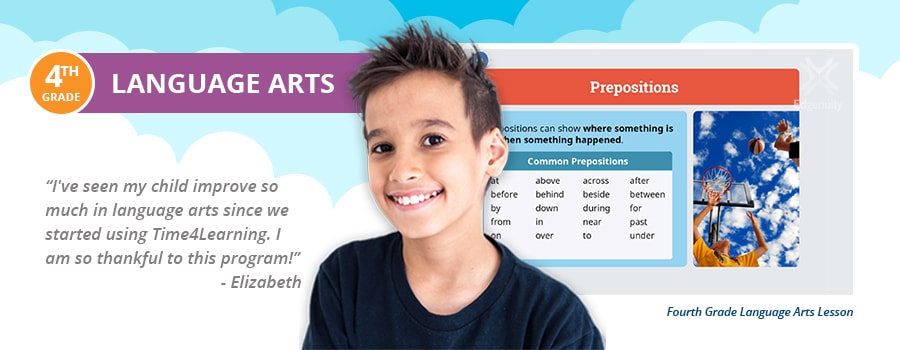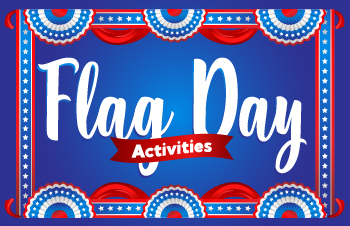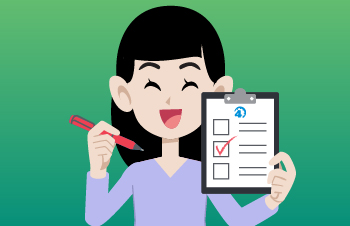Fourth Grade Reading Activities & Curriculum Standards
Do you have a child in fourth grade? Students at this grade level will be met with more reading challenges than before throughout all subjects. It is important fourth graders are supplied with the tools and resources needed to build higher levels of literacy.
Time4Learning recognizes the importance of providing a solid reading program for children. Children become fully engaged in the learning process through the use of fun, interactive activities, printable language arts worksheets, assessments, and positive reinforcement.
A fourth grade reading program will cover all English language arts strands. These include vocabulary development, reading comprehension, literature, writing strategies, writing applications, English language conventions, listening, and speaking. Each area covered provides a critical contribution.
Fourth Grade Reading – What are the Standards and Curriculum?
Fourth grade students are eager to learn. At this stage your child will be ready to accomplish visible progress in reading, writing, and language arts. Fourth grade reading activities provide an opportunity for children to apply the knowledge of word origins, derivations, synonyms, antonyms, and idioms to determine the meaning of words and phrases.
Time4Learning uses a comprehensive curriculum to help fourth grade students excel in reading. Children learn through guided reading, reading worksheets, language arts games, and many creative methods that make the fourth grade reading program fun for them.
Time4Learning creates a strong foundation for your fourth grader in the following language arts strands:
Vocabulary Development
Vocabulary building is central to all levels of reading. Higher understanding and deeper reading comprehension is possible as a child grows their knowledge of words.
Fourth grade Time4Learning students will learn to:
- Read with a higher level of fluency and expression
- Develop reading skills by using appropriate strategies when reading for different purposes (full comprehension, location of information, personal enjoyment)
- Apply comprehension strategies to literary and expository texts
- Generate and respond to essential questions, make predictions, and compare information from several sources
- Identify sequential order, fact and opinion, cause and effect, author’s purpose, inferences, and comparing and contrasting story elements
- Make and confirm predictions about text by using prior knowledge and ideas presented in the text itself, including illustrations, titles, topic sentences, important words, and foreshadowing clues
- Evaluate new information and hypotheses by testing them against known information and ideas
Language Arts & Reading Comprehension
The language arts section contains a number of learning activities, as well as worksheets and teaching materials that are primarily based on reading comprehension, writing skills, and vocabulary. Independent learning activities (ILA), think alouds, interactive guided instruction, and read and respond lessons will build and develop a working knowledge of language arts skills and give students plenty of practice. Your fourth grade Time4Learning reading program student will be taught to:
- Use knowledge of root words to determine the meaning of unknown words within a passage
- Distinguish and interpret words with multiple meanings
- Use a thesaurus to determine related words and concepts
- Build fluency using reading activities on synonyms, antonyms, homonyms, and idioms
- Form a working understanding of suffixes, prefixes, and reading skills
- Identify, interpret, and analyze passages
- Use Think Aloud exercises to summarize, predict, visualize, question, and clarify with extensive scaffolding and support
Literary Response
Another vital component of the reading program for this level is literary response and analysis using a fourth grade reading list. Through guided reading, students are introduced to a wide variety of significant works of reading level appropriate children’s literature.
In fourth grade, your Time4Learning reading student will learn to:
- Develop reading skill by distinguishing between structural features of various imaginative forms of literature including fantasies, fables, myths, legends, and fairy tales
- Identify the main events of the plot, their causes, and the influence of each event on future actions
- Determine causes for a character’s actions using knowledge of the situation and setting and of a character’s traits and motivations
- Compare and contrast tales from different cultures by tracing the exploits of one character type and developing theories to account for similar tales in diverse cultures using guided reading
- Discuss cause and effect, identify sequential or chronological order, and know about proposition and support
- Define figurative language (simile, metaphor, hyperbole, personification)
- Identify figurative language in literary works
*Reading Standards are defined by each state. Time4Learning bases its use of reading standards on the national bodies that recommend curriculum and standards and the interpretations of it by a sampling of states notably Florida, Texas, and California.
Writing Applications & Reading Strategy
Students learn to communicate ideas and information through creative writing for a variety of purposes such as: informing, persuading, influencing, responding, and creating. Lessons include the writing process, personal experience writing, and research.
Within the fourth grade Time4Learning reading program, your child will learn to:
- Focus on parts of speech, similes and metaphors, punctuation, double negatives, and spelling rules
- Formulate multiple paragraph pieces that focus on a specific purpose or audience
- Write original compositions, applying what they’ve learned about grammar and mechanics
- Write a variety of pieces (chronological, cause and effect, personal experience)
Speaking is another main ingredient of language arts. Time4Learning incorporates this strand within the fourth grade reading strategy by teaching:
- Various conventions of language to aid in communicating ideas orally
- Development of the student’s active listening and critical thinking skills to enhance understanding
- Various oral expressions
- Diverse vocabulary
- Effective speaking listening skills
Your child will learn to read narrative and expository text aloud, fluently and accurately, and with appropriate pacing, intonation, and expression.
With Time4Learning’s fourth grade reading program your student will continue building their foundation for literacy. It is encouraging to see the excitement as your child grows in fluency, reading comprehension, and confidence.
Additional Resources Related to Fourth Grade Reading
If you’re interested in the fourth grade reading program, you might also be interested in other fourth grade subjects:
- Fourth Grade Curriculum Overview
- Fourth-Grade English Language Arts Lesson Plans
- Strategies to achieve 4th-grade reading goals
- Fourth Grade Spelling Words & Vocabulary Lists
Online Curriculum for Homeschool, Afterschool and Summer Use
If you are just learning about Time4Learning, we’d suggest first looking at our interactive lesson demos.
Sign up for Time4Learning and gain access to a variety of educational materials, which will engage and challenge your child to succeed. Make Time4Learning a part of your children’s homeschool resources success.










